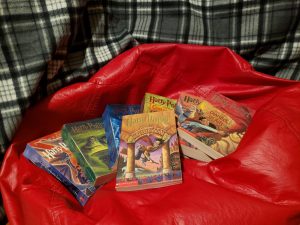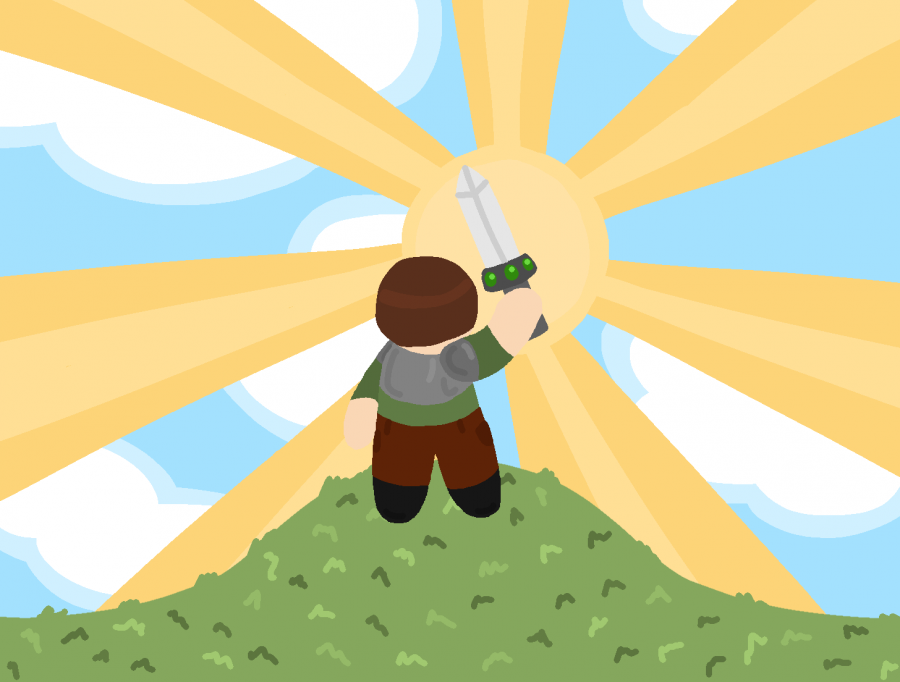What makes a chosen one: a trope analysis
Literary tropes have come in many different forms of media over the years. WSS takes a look at the chosen one trope.
The chosen one stands, triumphantly, wielding the legendary sword.
Over the course of many books, movies, and games, people start to find similarities within them. Tropes can be described as commonly used ideas or clichés among stories that can help define a genre. The chosen one trope, for example, is a trope commonly used in fantasy as well as science fiction.
The chosen one is exactly what it sounds like, someone that was chosen by something or someone. Stories that include a chosen one usually keep them as one of the main focuses of the plot and they’re also the only way to move that plotline forward. The title of the chosen one is usually reserved for the protagonist of the story, but could potentially be a side character or antagonist depending on how a character is chosen.
The chosen one has several, more specific, categories that chosen ones can fall into. Some of these are as follows: the prophecy chosen ones that are chosen because they’re included in a usually vague prophecy; the directly chosen ones that are chosen by a person or group of people; the artifact chosen ones that are chosen by a non-sentient object; and the chosen one’s incarnations that are from a line of chosen ones that follow the same path as their ancestors.

Going into more detail, one of the most iconic prophecized chosen ones would be Harry Potter, the Boy Who Lived as well as the one prophesied to defeat or be defeated by Voldemort. Having to follow the prophecy he’s placed in, Harry doesn’t have any choice in the matter, similar to many other chosen one categories.
Prophecies are often vaguely told to add a layer of mystery or surprise to be added later. Later in the Harry Potter series, it’s revealed that Neville Longbottom could also be the chosen one described in the prophecy. Although it could have been the case, Voldemort’s action to prevent the prophecy by attacking Harry ultimately decided who was in the prophecy.
Then there are directly chosen ones such as Po from “Kung Fu Panda.” Oogway was the individual who chose Po to be the Dragon Warrior. As the Dragon Warrior, it is their destiny to protect the Valley of Peace. Po does this within the length of the first film, by defeating Tai Lung.
Directly chosen ones have the chance to be chosen wrongly by the chooser, but Po is not an example of this. With the idea that someone can be chosen wrong, as Po believes he was, there’s a sense of doubt that often comes from directly chosen ones. In the beginning, the chosen one fears they won’t be able to meet the expectations of others or believe they truly can’t follow their destiny, but this subsides as the story progresses.
Artifact chosen ones come in a pair with a non-living object and a chosen one who was selected by it. The artifact can potentially be used by one sole user, a group of users based on their values, or a specific bloodline. Marvel’s version of Mjolnir can be categorized as an artifact with chosen ones because it can only be wielded by those who are worthy.
So far in the Marvel Cinematic Universe, only Thor, Captain America and Vision have been able to wield Mjolnir, making them both chosen ones. Depending on the artifact, anyone can wield it, but won’t be able to use it to its full extent. In the case of Mjolnir, one can’t lift it without being seen as worthy first.

Incarnations of a chosen one can include both descendants and reincarnations of a figure to follow a similar path as the original. Link from the Legend of Zelda series can be an example of this, with each game following a different Link through various times. The majority of Link’s reincarnations are meant to defeat Ganon and either kill or seal him away. Link is reincarnated because, as he is reincarnated, Ganon is reincarnated as well.
Several chosen one categories can also be used in tandem for an individual character. Using previous examples, Harry Potter follows a prophecy, but Voldemort indirectly chose Harry to be the chosen one of said prophecy by trying to kill him. This can make Harry Potter both a prophecy chosen one as well as a directly chosen one. Link, along with being a chosen one’s incarnation, is also an artifact chosen one as someone who can wield the Master Sword.
Writing a chosen one often creates one of two results for the end of the story, which can make the ending boring and predictable to some viewers. As chosen ones often follow some sort of destiny that only they can do, they can either accomplish it or fail it, the majority of the time being the former.
Most chosen ones also have feelings of fear because they were revealed to be a chosen one. Chosen ones may have to worry about living up to expectations or may have to worry about evening being capable of doing what they were told to do.
What a chosen one does have is the ability to choose is how the story is going to go. Even if the viewer knows what will have to happen at the end of the story, the road to the end can have a lot of twists and turns. Within the middle of the story, the chosen one gets many opportunities to get strong character development.
Chosen ones can be either really well received or very disliked. People can look up to specific chosen ones like the characters in the story because they have the ability to follow their destiny. People like the idea of being special, and chosen ones allow people to imagine what their life could be like with a special power or destiny.
There’s a lot of media that can be seen with chosen ones, waiting to be discovered. Many chosen ones are also waiting to be made and shared with the public once fleshed out. With how often the chosen one trope has been used, it’s not going to go away soon.
Your donation will support the student journalists of West High School. Your contribution will allow us to purchase Scholarship Yearbooks, newsroom equipment and cover our annual website hosting costs.

Carter McLaughlin is a sophomore at West High. This is his first year as an online staff reporter. In his free time, you can expect him to be on his Nintendo...

(she/her) Cassandra Michaels is a senior at West. This is her second year on the staff for the online publication as an artist. When she isn't busy she...



